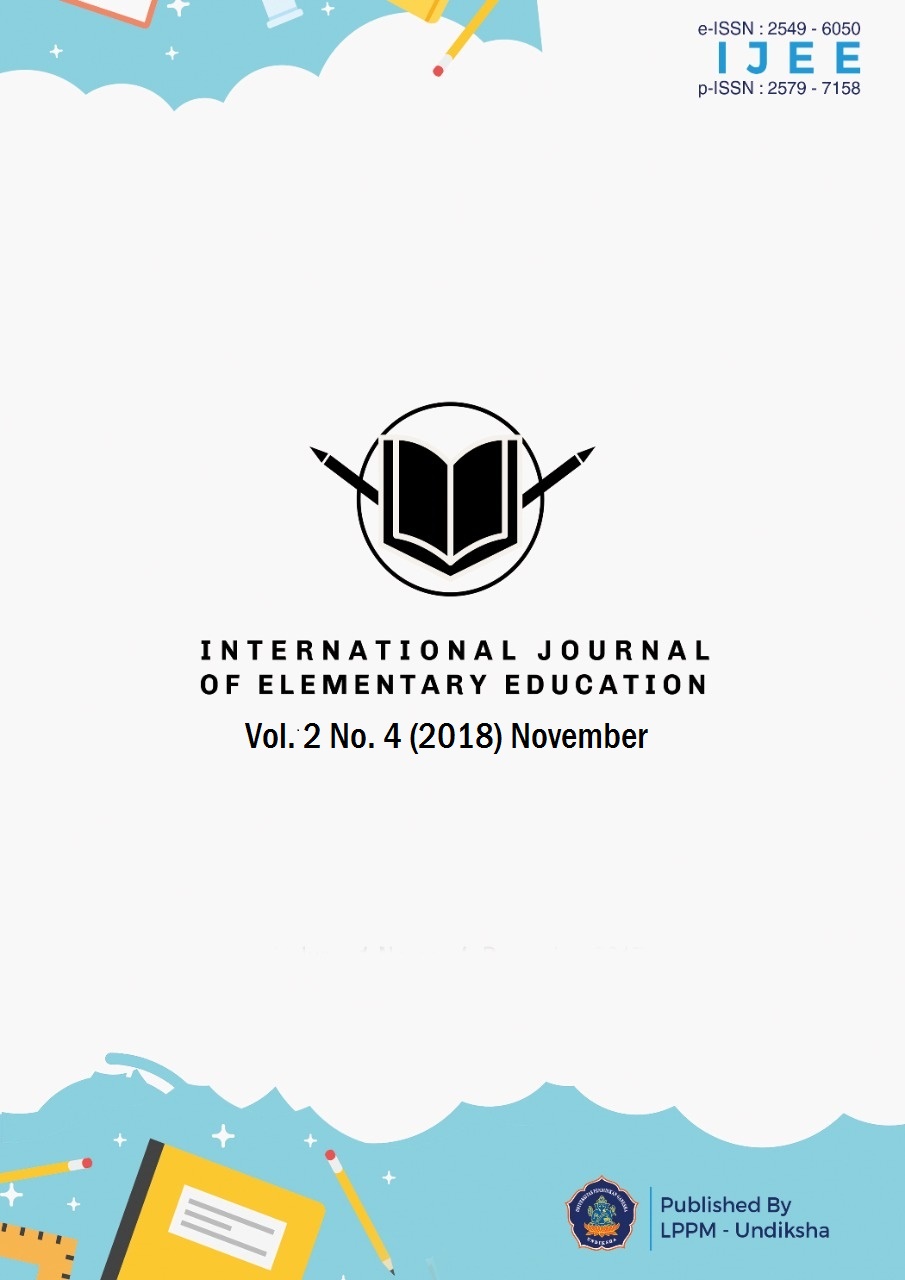Developing Interactive Comics As Learning Media For Civics and Indonesian Language in First Grade
DOI:
https://doi.org/10.23887/ijee.v2i4.16195Abstract
This is a R&D (Research and Development) research with the goal to answer the needs of interactive comics for civics and Indonesian language learning media in 1st-grade of ‘SD Negeri Samirono 01’. Data collection techniques are used observation, experts’ judgment, pre - post tests, and evaluation sheets. Subjects on this research are first grade students at ‘SD Negeri Samirono 01’. This research used ADDIE (Analysis – Design – Develop – Implementation – Evaluation) Devleopment model. The learning media got appropriate category result with percentage 69.23% for media expert judgment and 74.28% for materials experts’ judgment. The learning activity reach into effective, by there is a difference of after using a learning media. The Post-Test average grade is 78.65, which were bigger than Pre-Test average grade is 58.27. The learning media is able to help the students reaching their optimum abilities to understand the learning materials
References
Al Muhtar dkk, S. (2007). Strategi Pembelajaran PKn. Jakarta: Universitas Terbuka.
Anitah, M. P. (2012). Media Pembelajaran. Surakarta: Yuma Pustaka.
Astawa, I. G., Marhaeni, A., & Dantes, G. R. (2015). Pengaruh Pembelajaran Inkuiri Berbasis Buku Cerita Terhadap Minat Baca dan Hasil Belajar Membaca Bahasa Indonesia pada Siswa Kelas v SD Gugus III Kecamatan Abang. e-Journal Program Pascasarjana Universitas Pendidikan Ganesha Program Studi Pendidikan Dasar (Volume 5) , 1-12.
Azmi, S. R. (2018). Penggunaan Media Gambar Untuk Meningkatkan Kemampuan Menulis Paragraf Sederhana Padamata Pelajaran Bahasa Indonesia Di Sekolah Dasar. The 11th International Workshop And Conference Of Asean Studies In Linguistics, Islamic And Arabic Education, Social Sciences And Educational Technology 2018 (hal. 102-113). Asahan: Sekolah Tinggi Manajemen Informatika dan Komputer (STMIK ROYAL) Kisaran.
Comber, M. K. (2003). Civics Curriculum and Civic Skills: Recent Evidence. CIRCLE The Center for Information & Research on Civic Learning & Engagement , 1-5.
Darmadi, M. P. (2010). Pengantar Pendidikan Kewarganegaraan. Bandung: Alfabeta.
Gumelar, M. (2011). Comic Making Cara Membuat Komik. Jakarta: PT Indeks.
Hamidi, S. M., & Lutfi S.Pd., S. M. (2010). Civic Education Antara Realitas Politik dan Implementasi Hukumnya. Jakarta: Gramedia Pustaka Utama.
Marpaung, I. Y., & Siagian, S. (2016). Pengembangan Media Pembelajaran Bahasa Indonesia Berbasis Macromedia Flash Proffesional 8 Kelas V SD Swasta Namira. Jurnal Teknologi Informasi & Komunikasi dalam Pendidikan, Vol. 3, No. 1 , 28-40.
Mulyatiningsih, E. (2010). Pengembangan Model Pembelajaran. Pengembangan model pembelajaran , 5-6.
Prastowo, A. (2011). Panduan Kreatif Membuat Bahan Ajar Inovatif. Banguntapan Jogjakarta: Diva Press.
Savage, T. V., & Armstrong, D. G. (1996). Effective Teaching in Elementary Social Studies. New Jersey: Prentice-Hall Inc.
Slameto. (2015). Metodologi Penelitian & Inoasi Pendidikan. Salatiga: Satya Wacana University Press.
Smaldino, S. E., Lowther, D. L., & Russell, J. D. (2011). Instructional Technology & Media for Learning . Jakarta: Kencana.
Sumayasa, I. N., Marhaeni, A., & Dantes, N. (2015). Pengaruh Implementasi Pendekatan Saintifik Terhadap Motivasi Belajar dan Hasil Belajar Bahasa Indonesia Pada Siswa Kelas VI di Sekolah Dasar Se Gugus VI Kecamatan Abang, Karangasem. e- Journal Program Pascasarjana Universitas Pendidikan Ganesha Program Studi Pendidikan Dasar Volume 5 , 1-11.
Welton, D. A., & Mallan, J. T. (1996). Children and Their World. U.S.A: Houghton Mifflin Company.
Wuryandani, W., & Fathurrohman. (2010). Pembelajaran PKn di Sekolah Dasar. Yogyakarta: Nuha Litera.
Downloads
How to Cite
Issue
Section
License
Authors who publish with the International Journal of Elementary Education agree to the following terms:
- Authors retain copyright and grant the journal the right of first publication with the work simultaneously licensed under a Creative Commons Attribution License (CC BY-SA 4.0) that allows others to share the work with an acknowledgment of the work's authorship and initial publication in this journal.
- Authors are able to enter into separate, additional contractual arrangements for the non-exclusive distribution of the journal's published version of the work (e.g., post it to an institutional repository or publish it in a book), with an acknowledgment of its initial publication in this journal.
- Authors are permitted and encouraged to post their work online (e.g., in institutional repositories or on their website) prior to and during the submission process, as it can lead to productive exchanges, as well as earlier and greater citation of published work. (See The Effect of Open Access)









